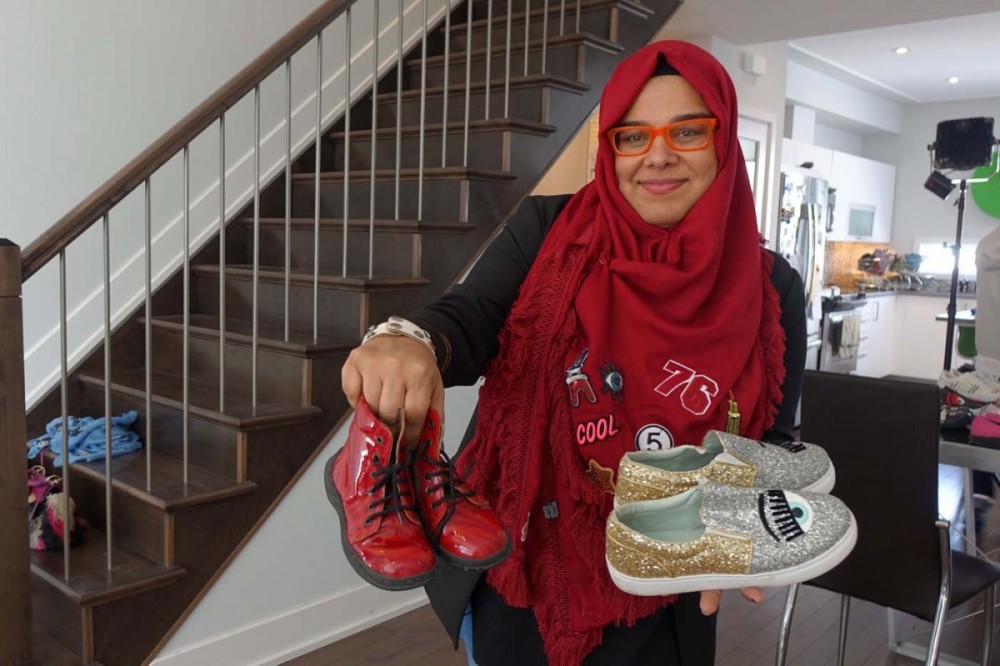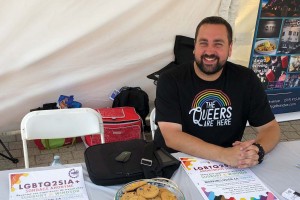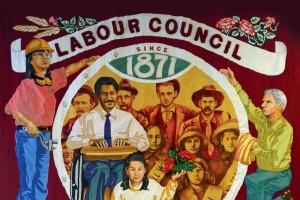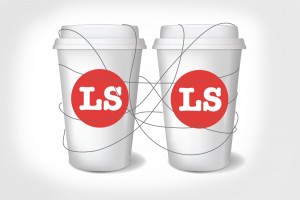Comedian, union activist and award-winning digital media strategist Shelina Merani uses stand-up to empower and educate by deconstructing stereotypes and building bridges.
Merani has performed for unions and organizations in Canada and the U.S., including the Canadian Labour Congress (CLC), the Union of Taxation Employees (UTE) and the Canadian Association of Labour Media (CALM). She has appeared onstage for the Toronto District School Board (TDSB), the World Youth and Student Travel conference and the Winnipeg and Halifax comedy festivals. She was also a finalist in the recent summer comedy competitions at Yuk Yuk’s and Absolute Comedy in Ottawa.
Merani spoke with Our Times about her life, her work and her journey to comedy and union activism.
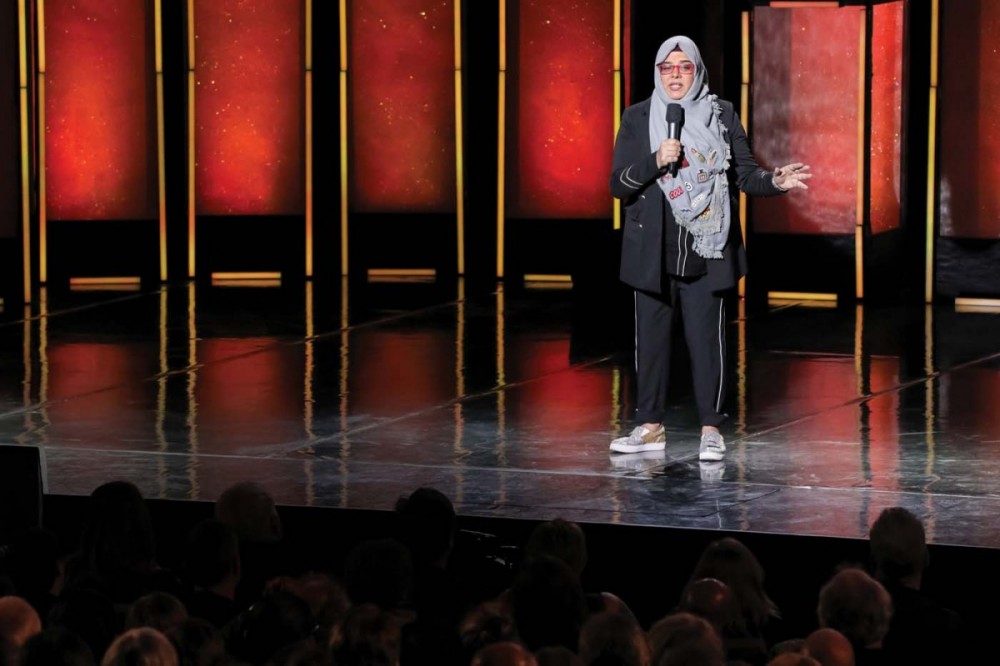
For Shelina Merani, stand-up comedy is about finding what brings us together. “My ultimate message really, is that we all have a common humanity.” PHOTOGRAPH: LEIF NORMAN
OT: Can you tell me about your experience growing up in Calgary and how that shaped you?
SM: I was an immigrant kid and that experience — the immigrant experience — really shaped me in terms of how I perceived myself. My parents and family were all born in East Africa — my dad’s side in Kenya, my mom’s side in Uganda. My mum and dad met there. I hate to say this but my mum was in a forced marriage — she made my dad do it!
My grandparents were from India and moved to Africa after they were married. Many Indians were going to Africa to help build the railway and set up businesses. In the early '70s in Uganda, there was a crisis with [then president] Idi Amin. He ordered the expulsion of his country's South Asian minority, giving them 90 days to leave the country. My grandparents, uncles and aunts went to the UK. On our side, in Kenya, we thought maybe it would be a good idea to also leave. In 1974, we moved to Calgary as landed immigrants.
When we did the stopover in London, England, on our way to Canada, my grandpa (who used to be a tailor) gave me a pair of red shiny patent go-go boots. Those red boots had deep meaning. My grandpa was saying: “You don’t have to fit in, you can be yourself, you can be authentic.” Either that or he had a shoe fetish. But that message of authenticity was one I always hung on to, even when going through tough times. That’s what I took with me when I went to Calgary.
One week after arriving in Canada, both my parents got jobs. My mom at Old Dutch potato chips, my dad at Canadian Pacific Railways. Both didn't speak English, so it was a very hard slog for them, as physical labourers. They would get me up at 5 a.m. to take me to day care and I’d be howling to stay home. I’m still traumatized by day care food! In fact, all white food.
It was only later that I realized my dad was a union activist. We used to go to these union Christmas parties that my dad would organize, and we would have so much fun. I didn’t realize at the time that it was a union activity.
That time in Calgary was tough. I was the youngest kid with three older brothers. Because I was considered more “Canadian” than them, I was constantly judged through that lens. My 13-year-old brother became the head of the household because my parents didn’t speak English.
It wasn’t fair for my brother, becoming a parental role model at such a young age. Everyone in my family was struggling in their own way and trying to survive in the new environment. I think many immigrants can identify with this.
I did not do very well in school and retreated into a world of books and music. I couldn’t deal with school because there was so much going on at home. I looked great, though, [laughing] because I had great fashion sense. The only thing that got me through high school was an English and Drama teacher who saw writing and acting ability in me. That is what gave me hope that maybe I could do something special one day.
One of my other brothers was a DJ, so I would just go into his room after school and listen to music for hours. It was an escape. Escape from not being accepted, escape from the racism I faced at school. I remember one day, I was walking down the street and someone shouted: “Hey Paki, go back to India.” I realized then that not only were people racist, they were also geographically challenged.
I never asked for support from anywhere for the isolation I felt. I was always on my own and trying to find ways to become resilient. I think this experience really shaped me and contributed to the narrative in my comedy.
Because of this feeling of being oppressed, I became a rebel. All my brothers had cars and drove, but my family wouldn’t let me drive. One day when I was 18, I decided to take my dad’s car for a spin. Unfortunately, I crashed into a 7/11. Oops.
I think that was an eye-opening moment for my family. It was also an empowering moment for me, because I was finally asserting myself. Just a few weeks later, I decided to go backpacking across Europe by myself. This experience was life changing in terms of the people I met and experiences I had.
Back in Calgary my poor dad was left to foot the bill for the skyrocketing car insurance. This is what happens when you don’t let women drive! Saudi women know only too well.
After my travels, I decided to move to Quebec City to study fine arts at University Laval. It was also there that I discovered Islam and met my husband. People always ask me if I converted because of my husband. Well, how else was I supposed to impress him? We eventually moved to Ottawa in 1997.
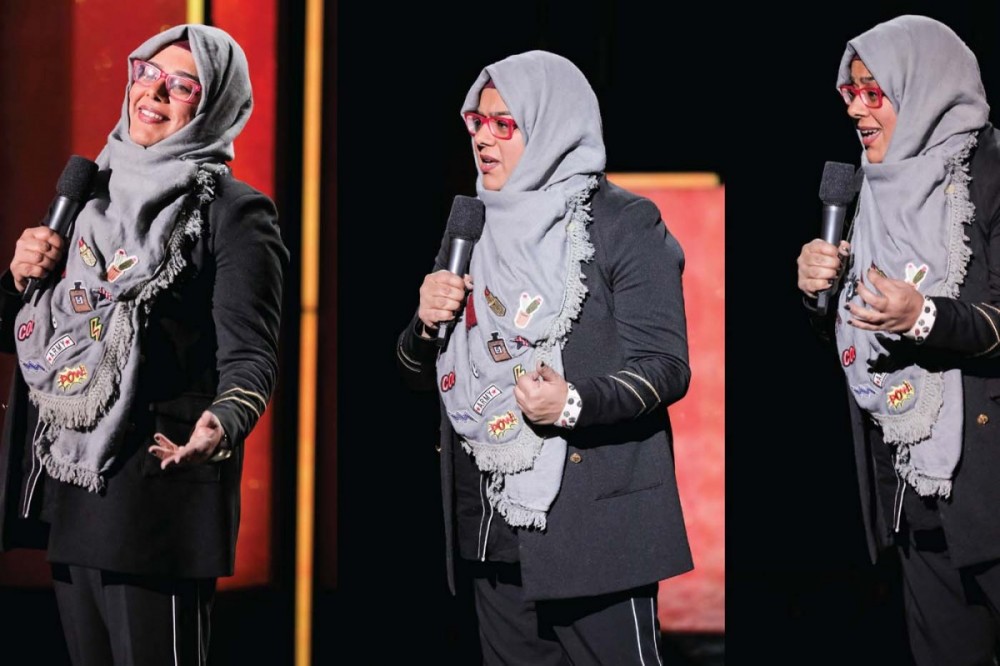
“The only thing that got me through high school,” says Merani, “was an English and Drama teacher who saw writing and acting ability in me. That is what gave me hope that maybe I could do something special one day.” PHOTOGRAPH: LEIF NORMAN
OT: What brought you to stand-up comedy?
SM: Growing up, I always had a good sense of humour. I was known as the class clown, and laughing and being quick and quirky became a coping mechanism. But it was a talent show called Expressions of Muslim Women in Ottawa that specifically brought me to stand-up.
The show was basically women getting together every year and highlighting their talents. Every year I would be asked if I wanted to do something. Finally, in 2013 I participated with a stand-up routine and did comedy on stage for the first time.
Leading up to it, I gave myself the objective of writing at least one joke every day. Everything spilled out — what I was feeling within the Muslim community, my workplace and community. My comedy routine was called “Basement Comedy,” a commentary on spaces of worship for women and things that really frustrated me about the Muslim community. It was cathartic getting all that out. When I did that it just went — whoosh! People really liked it, especially Muslim women because I was giving voice to issues they had.
From then on, I kept on getting invited to perform. Not actively seeking it out, but it just coming to me. Even though that was my first time doing stand-up, I just instinctively knew how to write jokes. It felt like a calling.
OT: How did it feel having a positive response to your stand-up from the outset?
SM: Unbelievable, it’s a non-alcoholic high! By the way, Muslims invented alcohol. You’re welcome. Seriously, though, it almost felt like finally acceptance for who I truly was, going back to my grandpa’s message. I can’t describe it.
I once took a workplace course on emotional intelligence and the trainer said, “Whenever you’re feeling really discombobulated, think of a moment that makes you feel really good. That’s your home base.” So that’s my home base now — when I’ve done well at a show or I get a boost, like when my CBC documentary “Shelina Stand Up!” was shown on The National in December 2018. It’s a feeling of authenticity. I try to be careful, though, because I don’t want to rely on an artificial feeling of acceptance from the outside.
And now, being on stage has become the place where I’m the most comfortable, where I come out of my shell from my introvert tendencies. My drama teacher always said I had good stage presence. My comedy teacher in Ottawa also confirmed that.
Stage presence is very mysterious. You can’t really describe it — either you have it or you don’t. I’ve been trying to figure out what it is, and I think there’s a spiritual aspect to it. People have said I create empathy on stage. I think that’s because there’s a feeling of instantly relating and connecting to people.
OT: How does stand-up comedy as a medium connect with your activism?
SM: I call it a “stand-up, speak-out” journey. That’s why my stage name is “Shelina Stand Up,” because when I was young I really struggled to do those things — to stand up and speak out.
When I came to Ottawa, my first job was at this immigrant-settlement-services organization, OCISO [Ottawa Community Immigrant Services Organization]. I was a manager helping newcomers in the school system. All my jobs related to helping, taking action or making a difference for vulnerable communities.
When I worked at the National Gallery of Canada as an education officer, I always integrated the idea of human rights and diversity into my programming for youth and adults, event partnering with Amnesty International as well as environmental groups. Eventually, I became involved in my union, and then I landed a job at the PSAC [Public Service Alliance of Canada], so there was a theme being threaded into the type of work I was doing. Comedy was just really the next stepping stone in expressing myself and trying to make a difference.
OT: Do you have a message as a comedian?
SM: When I started doing comedy I thought, “Ah, I’m just going to do this for the Muslim community,” then I realized, no, it had to go beyond that. My ultimate message really is that we all have a common humanity.
What’s interesting is that when I started, I took a comedy course and for one exercise they had us write what we think people first see about our physical appearance. Seriously, it didn’t even occur to me it was my headscarf! I am so oblivious to it, unless I’m having a bad hair day!
But it was really revealing for me because the answer is, that is what they see. As a Muslim woman in general I don’t walk around thinking, “Oh there’s Islamophobia and people are looking at me a certain way.” I feel like I am no different than anyone else. I think this attitude has helped me build relationships with people and helped them understand my faith.
It is about finding what brings us together; what are our common values? I’m constantly using references from popular culture to help people connect with me. For example, I talk about Ramadan, or what we Muslims call the Hunger Games; or my answer to questions about what I look like underneath all this garb: A Victoria’s Secret model — at an all-you-can-eat buffet.
During the Q&A after a recent comedy keynote gig, people were asking me what it’s like to be a Muslim and a comedian. I just found it such a great opportunity to answer questions that people are afraid to ask. One woman had the same question you have: “Ultimately what is your message?” And I answered: “Demanding respect for a religion that invented Shawarma!”
That said, I’m also trying to educate by explaining that there is a difference between cultural and religious, and between practices that people may think are Islamic but have nothing to do with the faith. Female genital mutilation is one example. Forcing women to cover their hair or not letting them drive are others.
There is also a message of wanting my mainstream audience to realize Islam is at home here, is part of the shared experience of life in this country. I am not from somewhere else. For example, I always get the question, “What’s that called on your head?” And I reply, “Well, it’s called a scarf.” People expect to hear an ’exotic’ term, and that’s exactly my point. I’m from here, not anywhere else.
I want my audiences to go beyond my “Muslim-ness” and just see me as a human being.
OT: How did you become involved in union activism?
SM: I was already a PSAC member when I worked at the National Gallery and was nominated as an equity rep for a union committee. Eventually, I started working in PSAC’s communications department and recognized, through the work, that I had a knack for communications and political action campaigns. I was a good writer, a skill important to have in comedy.
I helped organize important campaigns like Thirsty for Justice, about the water crisis in Indigenous communities. Vote to Stop the Cuts was right before the 2015 federal election, about the cuts the Harper government made to public services. Doing those campaigns meant working with a team and being creative and innovative. It was almost like coming home for me; using my creativity and energy to support and impact people in a positive way.
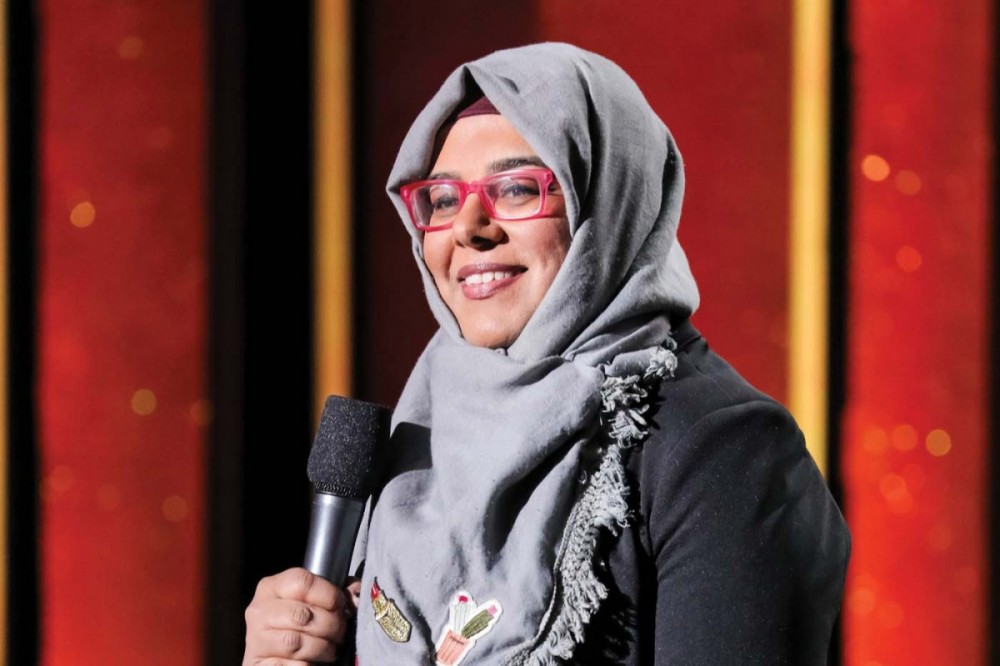
“I’m not able to do what they call ‘on-the-nose comedy,’ which is comedy just to make people laugh. It’s got to be about making people think.” PHOTOGRAPH: LEIF NORMAN
OT: How does your union activism overlap with your comedy?
SM: For me, union activism means speaking out about important issues, and my particular focus is anti-oppression. My story provides an equity lens but also relays my struggles that I hope working people can relate to and learn from. For example, struggles with the immigrant experience, of being a Muslim woman, racism and trying to truly find my own path and voice. These are all experiences that working-class people in Canada have. I think there is a universal message there.
I’ve done comedy gigs for labour organizations. I emceed and performed at the Canadian Labour Congress, where I was sharing the stage with Angela Davis — that was huge for me! There were 2,000 people in the audience!
I’ve also performed at the Canadian Association of Labour Media conference and just a few months ago, was invited to do the Union of Taxation Employees equity conferences, three one-hour comedy keynotes in Calgary, Toronto and Montreal.
For that kind of performance, you have to really know your audience, In this case, they were all tax workers so I did all these jokes about similarities and differences between tax workers and Muslims. We both get hate mail! [laughs]. Or tax season is the only time when all Canadians are praying five times a day!
OT: What was it like meeting Angela Davis?
SM: First of all, performing in front of Angela Davis [laughing], it was so cool! It was amazing. This woman who’s been militant and authentic her whole life, who has spoken out . . . that’s what I aspire to. I also wish my hair looked like that. She did also say she was laughing in the wings.
OT: Tell me more about your work with PSAC and Thirsty for Justice.
SM: A resolution had passed at one of our conventions that we do a campaign about the water crisis in Indigenous communities, and we launched a campaign called, Thirsty for Justice. We partnered with the community of Grassy Narrows demanding safe drinking water in First Nations communities. Grassy Narrows is only one of more than 100 First Nations communities that do not have access to safe water for drinking, cooking and bathing. The campaign received a couple of awards through the Canadian Association of Labour Media.
OT: Why unions?
SM: When I was working at the National Gallery of Canada as an education officer developing programming for youth, teens and adults, although it was a great job, I was wondering, am I really making a difference? Whereas at the PSAC, I can’t believe I’m going to work every day to do something that’s making a big impact. And the types of people you work with — a lot are activists and social justice people who do crucial work on behalf of our members. I just feel very blessed.
When I did the comedy keynote, I showed slides about some of the campaigns I’ve coordinated and I said to myself: Wow, this is what my life has culminated in, working with this organization that’s also standing up and speaking out. What better career could I have? It feels like coming full circle.
OT: Do you approach your comedy with that same goal of making a difference?
SM: Definitely. I recognize the impact that comedy can have.
I talk about things that people may not be used to hearing about in comedy clubs. For example, in 1999, my husband and I, and my daughter, who was a few months old, had gone to Saudi Arabia. Shockingly, we saw a beheading. This was traumatic. I actually wrote an article about it called “Dead Woman Walking.” The butt of the joke I told was the Saudi government. I just feel I have a responsibility to make people aware because this is un-Islamic.
My comedy always has to have a message behind it. I’m not able to do what they call “on-the-nose comedy,” which is comedy just to make people laugh. It’s got to be about making people think, to have a subtext.
It’s important for me to “punch up,” the idea of using comedy to “comfort the afflicted and afflict the comfortable.” I’ll see an issue and want to write a joke about it — the first question I ask myself is, what do you want people to think about this? That’s always the premise that I start from.
OT: How do you deal with negative responses to your act?
SM: I cry. Just joking. The thing about comedy is that people aren’t always going to be happy. You’re putting yourself out there. You’re taking risks. But obviously I must have something in me to deal with it; otherwise I probably wouldn’t do it. And people keep saying, “Wow, you’re so courageous!” I don’t see this as something courageous; it’s almost like something I have to do.
OT: What are you looking to now? What does the future hold?
SM: I just finished the Halifax and Winnipeg comedy festivals and those shows will be televised on CBC next year. I also regularly perform at local comedy clubs because it is important to be on stage and perfecting the craft. CBC recently asked me to write an article for their series Viewpoint: It was called: “Why Bling is my thing,” and I talk about those red boots my grandpa gave me and coming back to the message of being authentic. I also want to give a message to young girls that if they’re going through difficult times, there are outlets. Because I never knew I had that outlet. I didn’t think it was possible. It is possible to feel empowered.
And through comedy I think the message can resonate a lot more easily. With comedy, you break a million barriers at the same time. Because people’s hearts are open to you, because they’re laughing. And that’s a fundamental human emotion. Laughing, and being joyful. — OT
This interview has been edited for length and clarity. For more information about Expressions of Muslim Women, visit expressionsofmuslimwomen.com.
* * * * * * * * * * * * * * * * * * * * * * * * * * * * * * * * * * * *
ISLAMOPHOBIA AT WORK: Challenges and Opportunities
Shelina Merani's comedy actively tackles Islamophobia, encouraging us all to do the same. The following recommendations to help combat Islamophobia are excerpted, with permission, from the excellent Canadian Labour Congress report “Islamophobia at Work: Challenges and Opportunities.”
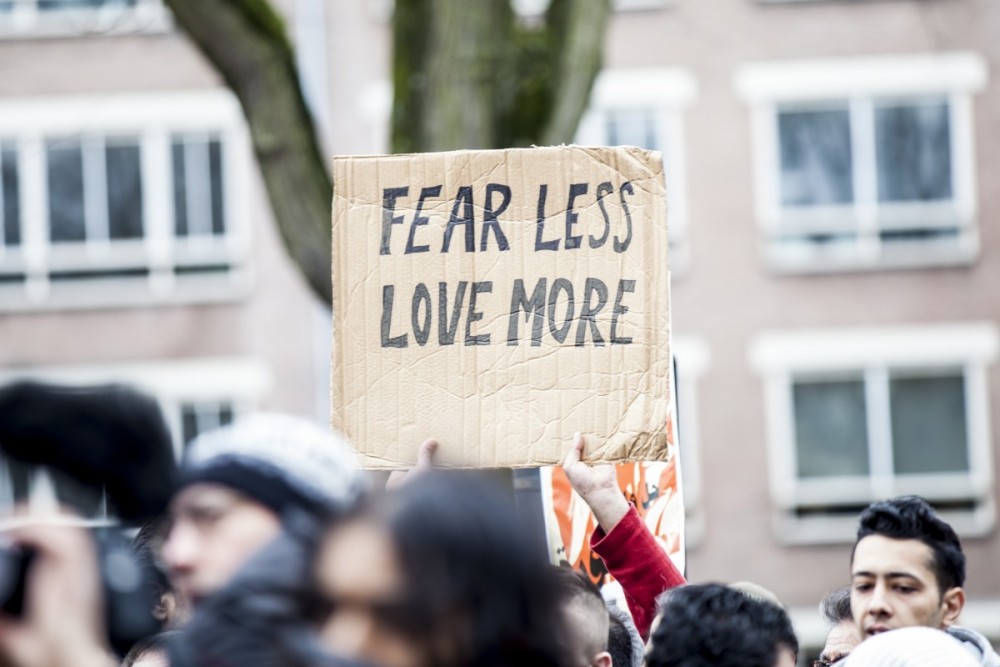
PHOTOGRAPH: iSTOCK/COURTESY CANADIAN LABOUR CONGRESS
RECOMMENDATIONS TO TRADE UNIONS
1. Champion fairness, equity and social justice for Muslims in Canada. Speak out, immediately, against any backlash or incidents of discrimination against Muslims in your community. Organize with allies and spokespeople from the Muslim community so you can find ways to speak out together.
2. Provide bystander training and tools to union and labour council members so they are equipped to immediately speak out against discriminatory words or actions when encountered, no matter where they occur.
3. Invest in educating members about the threat to workers represented by Islamophobia and its destructive consequences for workers’ human rights, solidarity, and labour organizations.
4. Press governments and human rights commissions to invest in better data gathering on the incidence and manifestations of Islamophobia in the workplace.
5. Engage and educate members about the dangers represented by the Islamophobic far-right political movements.
6. Prioritize education around economic inequality and insecurity to attack the social and economic foundations of xenophobia, nativism and racial nationalism.
7. Continue to work alongside the peace movement and faith groups to demand diplomatic and peaceful resolution of international conflicts, while opposing Western military intervention against Muslim nations justified by the “global war on terror.”
8. Advocate and collectively bargain for the creation of workplace human rights committees along the lines of the internal responsibility system, as proposed by the 2000 Canadian Human Rights Act Review Panel (La Forest report).
9. Press the Government of Canada to restore the legal employment equity requirements for federal contractors.
10. Press all levels of government to adopt pro-active pay equity legislation to eliminate wage disparities between men and Black women, Indigenous and Muslim women.
11. Support the work of the Alliance of Canadian Cinema, Television and Radio Artists (ACTRA)’s Diversity Committee in increasing the participation and representation of Muslim actors and characters in TV, film, radio and other cultural media in Canada, and in resisting the vilification and stereotyping of Muslim people in media content in Canada.
12. Reach out and invite Muslim community allies to labour meetings, gatherings and events, and provide space to learn about the experiences and perspectives of Muslims themselves and learn about the work that unions and labour organizations are doing. Small gatherings for sharing and exchanging information, even just conversation can break down barriers and build solidarity.
13. Partner with service organizations, community groups, schools and places of worship in your community that are providing services or assistance to Muslims.
14. Lobby the federal government to ensure Canada’s humanitarian commitment to refugees continues and to lead by example, by standing up to any racism and hatred directed towards Muslim newcomers and other racialized groups in Canada and internationally.
15. Include articles, commentaries or blogs in internal communication networks, so members can learn more about Muslims in Canada and how to help. Quickly deal with any backlash from members on your social networks too.
16. Co-host and co-sponsor activities at community events (fairs, festivals, tournaments, etc.) where union members, community members and Muslims in Canada can interact: tobogganing races, hot chocolate or fruit cocktail socials, bake sales, BBQs, picnics, potluck suppers, etc.
17. Seek out the leadership of your local Muslim community to keep the communication channels open between the community and your local union and labour council leadership.
18. Publicly profile and promote union and labour council’s support and efforts in fighting discrimination against Muslims; sending a strong signal to everyone in the community. For example, write a letter to the editor or an opinion piece for local media, co-author it with community allies to show there is widespread support, organize a public statement (like a news release) to publicize your support efforts locally and how that connects with efforts across the country.
19. Work with the CLC, affiliate unions and labour councils to actively participate in the federal government’s cross-country consultations on a new national anti-racism approach to find new ways to collaborate and combat discrimination.
20. Work to increase equity representation in CLC committees and on decision-making bodies such as Canadian Council.
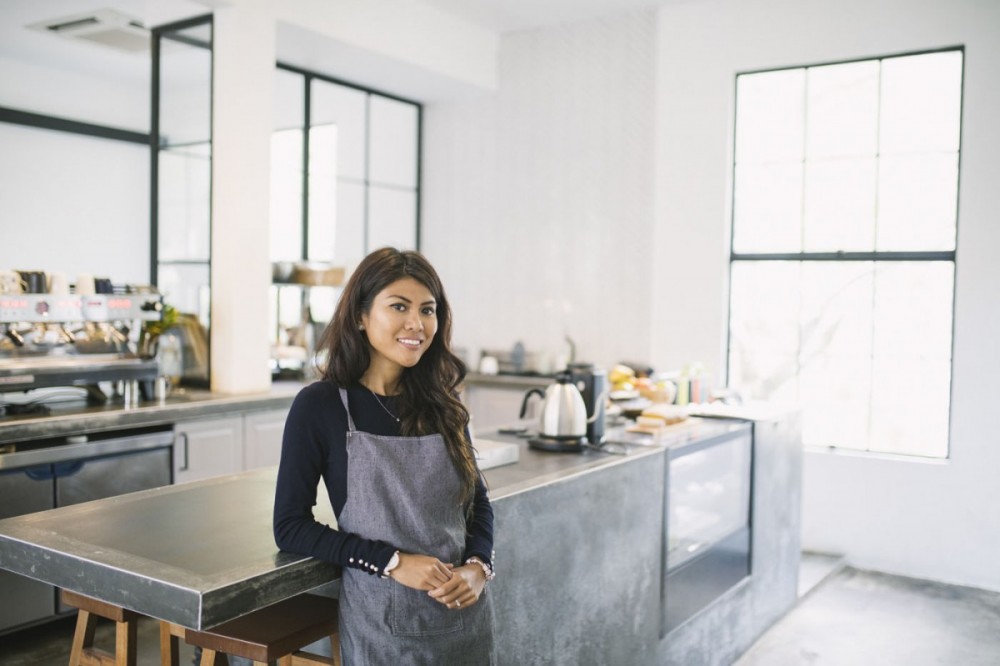
PHOTOGRAPH: iSTOCK/COURTESY CANADIAN LABOUR CONGRESS
RECOMMENDATIONS TO EMPLOYERS
1. Ensure employers, management and employees understand their obligations under the Canadian Human Rights Act to Muslim employees in the workplace and to create a fair and healthy workplace free from discrimination, harassment, prejudice and bias. Provide resources to ensure that racialized and/or Muslim employees know their rights in the workplace.
2. Develop organizational and workplace policies and practices that are fair, equitable and free from discrimination, harassment or retaliation against anyone, including racialized and/or Muslim employees who work for the organization or those who receive services from it.
3. Create and ensure a positive and constructive organizational and workplace culture that is safe and respectful of multiple diversities of their employees, including Muslim employees.
4. Review organizational and business policies, practices and services as well as organizational by-laws to remove any existing or potential barriers to a discrimination-, harassment- and bullying-free workplace for diverse employees including Muslim employees.
5. Make anti-Islamophobia and anti-racism education or training available to leadership, managers and employees.
6. Remove applicants' names from job applications to combat unconscious bias during the hiring process. At both staff and management levels, ensure there is no bias, prejudice or discrimination against employees from diverse backgrounds, including Muslim employees, in the entire employment process including onboarding, retention, and promotion.
7. Ensure there is no bias, prejudice or discrimination against employees from diverse backgrounds, including Muslim employees, in wages and compensation.
8. Create joint workplace committees with leadership, management and employees through bargaining agents or Muslim and/or racialized employee representatives to develop, monitor, and evaluate anti-Muslim and anti-racism initiatives.
9. Work with employees, through bargaining agents or Muslim and/or racialized employee representatives, to ensure there are policies and procedures to address workplace harassment, violence or bullying. Reports of such incidences should be reported promptly and appropriate remedies taken.
10. Establish and publicly promote a commitment from leadership, at the top levels of the organization or business, against Islamophobia in the workplace and society.
11. Ensure the success of the duty to accommodate Muslim employees’ needs concerning religious observance by addressing existing or preventable barriers, for example:
a. Two of the five prayers per day take place during a 9 a.m. to 5 p.m. workday. A quiet, clean space in the workplace with some privacy is desirable;
b. Washing (ablution) of face, hands, arms, and feet with clean water is required of Muslims before prayer. This can be done in the workplace washrooms, or a place with running water;
c. Friday congregational prayer is about one hour around lunchtime. An employer, in discussion with the Muslim employee, can arrange flexible work hours such as coming in earlier or leaving later on Friday;
d. Fasting during Ramadan is an important practice in Islam. Muslims abstain from food and drink including water from dawn until sunset for one month. An employer, in discussion with the Muslim employee, can arrange:
i. for flexible work hours such as shortening the workday if a lunch break is not taken by the employee; and
ii. for the employee to be exempt from work meetings and events that serve food and drinks during Ramadan. The employee and employer should discuss to find available dates and options;
e. Social and work events celebrating religious holidays of other faiths where alcohol is served may not be comfortable for Muslims. These employees should not be penalized for not participating in such events. Also, a Muslim employee should not be asked to serve or sell religiously offensive (haram) products, such as alcohol;
f. Pilgrimage (Haj) to the city of Mecca, which takes about a week, is required of Muslim adults at least once in their lifetime. Muslim employees may use their vacation days and/or unpaid days to fulfill this rite.
g. Holidays for religious observance and celebration (Eids) happen twice a year. Canadian employers are required by law to give Muslim employees two full days for religious observances in addition to vacation and statutory holidays;
h. Clothing and behaviour for Muslims must be modest according to Islam. Muslim men are required to wear loose and non-transparent clothing covering, at a minimum, from their navel to their knees. Some Muslim men wear a small head covering, called a ku. Some Muslim women wear loose-fitting, non-revealing clothing as well as a hijab, or some a face veil. The employer and Muslim employee may want to discuss workplace dress code exemptions, if necessary;
i. Many Muslim men for religious reasons wear beards. For health and safety reasons in the workplace, employers may require employees with beards to use proper covering such as hairnets or masks;
j. As a sign of modesty, some Muslims do not engage in the practice of shaking hands with an unrelated person of the opposite sex. They also avoid any physical contact with members of the opposite sex;
k. Dietary requirements for Muslims prohibit the consumption of alcohol, pork, and pork by-products according to the Qur’an, Islam’s religious book. Many practising Muslims will only consume halal meat and poultry slaughtered according to certain standards of slaughter and preparation.
Examples were adapted from the National Council of Canadian Muslims' Employer Guide. Visit the Canadian Labour Congress for more information. — CLC
Our Times would like to thank the CanadianLabour Congress for allowing us to publish this excerpt as an accompaniment to Haseena Manek's interview for Our Times with Shelani Merani.
Haseena Manek is an Ottawa-based labour journalist, and Our Times’ Online Community and Outreach Coordinator. Follow her on Twitter here.


